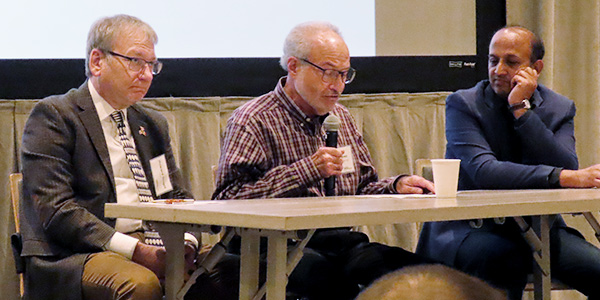By Holden Mann
MANHATTAN BEACH, Calif. — NERC and utility operators see considerable benefit from applying digital technologies to the power grid, but adopters must take their vulnerabilities into account as well.
During a panel on digitization at NERC’s Member Representatives Committee meeting on Feb. 5, moderator Sylvain Clermont, director of operational technologies convergence at Hydro-Québec TransÉnergie, said operators are only scratching the surface of the long-term implications of new technologies — both positive and negative. Even at this early stage, the capabilities are too enticing to ignore.
“Most of us have started some kind of digitization of our grid and our facilities, but we are at the beginning of trying to see all the potential of that,” Clermont said. “Now you can access a relay … from any kind of control center. … So we will change the way we do maintenance by having all that data.”
Reward and Risk
However, participants in the panel also raised familiar warnings that bringing in smarter systems can also mean inviting unwanted guests. In the case of new hardware like drones, that could involve backdoors engineered by the manufacturers. Communication software can also contain inadvertent vulnerabilities that can be exploited by a growing list of unscrupulous actors targeting U.S. utilities. (See Report: Oil, Gas Hackers Expanding to Grid.)
Mukund Kaushik, director of digital at Southern California Edison, observed that most utilities are well aware of the risks of introducing new technology into their systems. At the same time, those who want to provide better service to their customers or keep their performance in line with the broader industry may feel they have no choice but to upgrade and address the risks that might arise as they go.
“Most of the innovation that’s happening on the IT side is happening on the cloud,” Kaushik said. “I’m constantly going back and forth [with] my cyber team in terms of how do we make sure we’re not compromising our security, but at the same [time] take advantage of some of the technology that exists out there to move the ball forward.”
Evolving Cybersecurity Threats
The danger of cyberattacks was a major focus of discussion, with Eric Udren, an executive advisor at Quanta Technology, admitting that “the adversaries will always be getting better at this.” However, utilities cannot become so focused on security risks that they fail to adopt new technologies to address a rapidly changing generation environment.
“There are some that would say — from a knee-jerk reaction — ‘Well, because of the cyber exposure of a microprocessor-based relay, let’s go back,’” said Howard Gugel, vice president and director of engineering and standards at NERC. “But there was a reason why we went to microprocessor-based relays. … In the ‘good old days,’ we were flying in the dark a lot of times.”
Gugel pointed out that security is only one challenge posed by integrating digital communication into the grid. Distributed energy resources such as rooftop solar panels and batteries are made possible by such technologies, but they have also been found to cause significant issues with monitoring and planning for grid stability. (See Rooftop PV’s ‘Hidden Loads’ Challenge Grid Planners.)
In light of these emerging concerns, panelists agreed that NERC will need to move quickly to establish standards and procedures to ensure reliability and safety. At the same time, the ERO Enterprise must ensure that entities have the flexibility needed to pursue future innovations.
“In all new reliability standards, we should be thinking not only about what is the problem we’re solving now, but what will the industry be like in 10 or 20 years, and what are we putting in this standard that would not inhibit a direction that we see coming?” Udren said. “By all means, solve the current problem, but look ahead also.”




